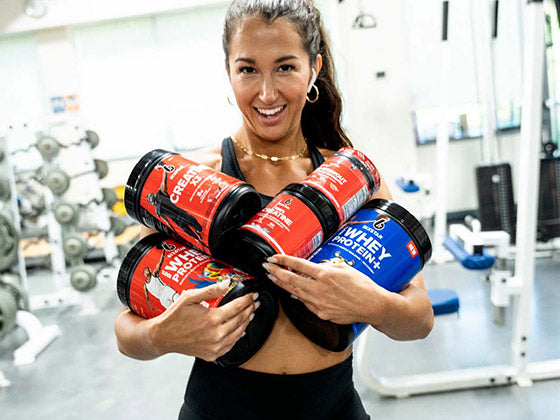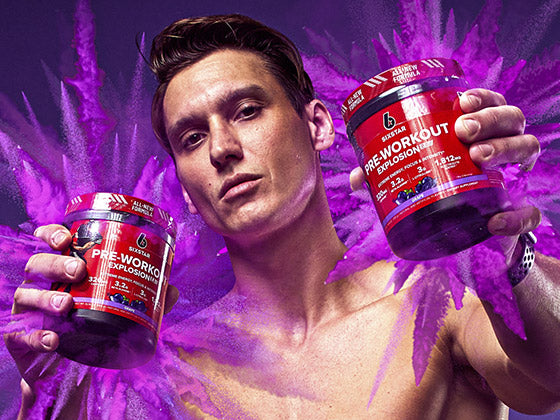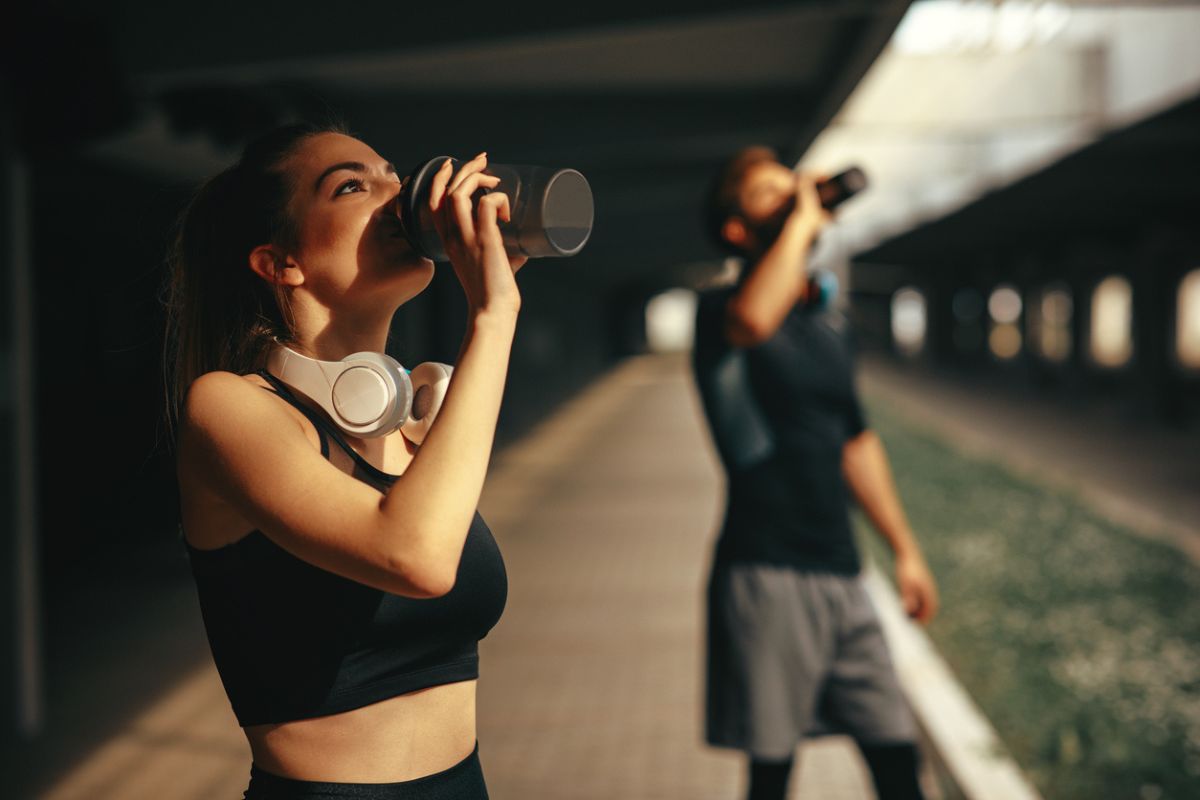We’ve all heard the expression – never do anything on an empty stomach. This especially applies when you head out to your soccer game.
But let’s face it – wondering what to eat before a soccer game is more challenging than it sounds! As much as you want to indulge in the tastiest dishes, you have to keep your performance in mind. Imagine playing on a belly full of pasta alfredo – not the best combo, right?
If you want to do your best on the field, thinking about soccer nutrition is a must. So, if you’re having trouble coming up with a meal plan that will benefit you, we’re here to help!
In this guide, we’ll take a deep dive into what to eat before a soccer game, foods to avoid, and why nutrition plays a key role in your performance.
Why Soccer Nutrition Matters?
Did you know that over 50% of athletes are underperforming due to poor nutrition? We all know that food gives us an energy kick, but it does so much more than that – both on and off the field.
Food for soccer directly impacts your performance and recovery. When your body is supplied with the appropriate nutrients, you have the energy to go through your entire match, your muscles perform optimally, and recovery isn’t as intense. And this is just the tip of the iceberg!
Here’s how soccer nutrition gives you the edge you need:
1. Energy
Soccer is a high-intensity sport, requiring lots of stamina and physical endurance. Naturally, you need lots of energy to do your thing on the field.
What’s the best way to get the energy you need? You guessed it – food.
Carbohydrates are the real MVP’s here. Instead of supplying your body with energy all at once, carbohydrates, especially complex ones, ensure a sustained process. When you combine them with other important nutrients like protein during your pre-game, you lower the chances of early-on fatigue and muscle soreness.
Shortly, energy food for soccer puts you on your A-game on the field!
2. Hydration
You can’t play soccer without being properly hydrated. That is, if you want to perform your best.
Naturally, this involves endless water bottles and other hydro-boosting drinks. Still, food can also help you up your hydration levels. Take cucumbers – they’re 96% water and are super healthy.
When you’re hydrated, you’ll improve your physical and mental performance during the game, and also prevent muscle cramps. Additionally, since you lose a lot of water while you’re playing, it’s important to restore your hydration levels for optimal recovery.
3. Muscle Performance & Recovery
No matter how much you’re giving it your all during practice, you’ll find it more challenging to achieve your goals without the proper soccer nutrition.
Your muscles are under a lot of strain, so they need fuel to ensure they’re running like a well-oiled machine. Protein can help you with this. A diet with lean proteins aids muscle growth and tissue repair, meaning they’ll be able to endure more when you push the limits when it’s most needed.
Most importantly, you shouldn’t forget about recovery. While ice baths, massages, and other practices can provide surface-level relief, you need to let your muscles recover from within. Luckily, with a proper meal plan, your recovery will be faster and less intense, which is especially helpful if you have back-to-back games.
4. Mental Focus
In addition to your physical performance, your mental focus plays an equally important role. You need to be quick on your feet (no pun intended!) and make on-the-spot decisions, some of which may get you a win.
Your brain is dependent on glucose, which is derived from carbohydrates. With a nutrient-rich diet, packed with energy foods for soccer, your mental sharpness and concentration will improve, leading to smarter moves and tactics.
What Are The Best Things To Eat Before A Soccer Game?
So, let’s get into the main question – what to eat before a soccer game?
Soccer nutrition includes a combination of carbohydrates, protein, healthy fats, and hydration. Think of foods like fruits and greens, quinoa, lean chicken, fish, and so many more. Having these energy foods for soccer leads to improved performance, but it’s also important when you eat them (more on that later!).
Let’s break down all of these food groups so you can come up with a diet plan that works for you. We’ve also included some sample meals for extra help!
1. Carbohydrates
Carbohydrates are the pillars of soccer nutrition. As a primary energy source, they help you physically prepare for the game, especially when it gets super intense.
However, you should know that not all carbohydrates are equal. On the contrary, there are simple and complex carbohydrates.
Simple Carbohydrates, usually found in sugary snacks and drinks, spike your blood sugar, leading to a severe energy drop. That’s why sometimes you feel so drowsy after having so much sweets. Obviously, simple carbohydrates can only negatively impact your performance, so this is the kind you should avoid.
Complex Carbohydrates provide a sustained energy release, making them more filling and healthier for the body. They’re packed with many nutrients, meaning the more you include them, the better.
Some good complex carbohydrates to include in your diet are:
Whole grains
Oats
Broccoli
Bananas
Peas
Berries
Quinoa
Sweet potatoes
Black beans
Carrots
Finally, you may have heard something about carbohydrate loading/bulking. This means increasing the carbohydrate intake days before the game to maximize the glycogen content in the muscles. Although this isn’t necessary, it can be quite beneficial before important matches and tournaments.
2. Protein
Protein, protein, protein – we’ll never stop talking about it! As one of the most important components in our bodies, protein intake should be high on your priority list if you have a big game coming up.
Protein helps with muscle growth and recovery. We all know how sore the body can feel after an intense match. With enough protein in the body, the recovery process will be much smoother, and you will have more strength and endurance on the field.
Beneficial lean protein sources are:
Fish
Chicken breast
Turkey
Eggs
Almonds
Yogurt
Chickpeas
Tofu
Legumes
Ideally, you should consume about 20-30 grams of protein before your match. However, if your game is happening in the morning, reaching this number can be challenging. That’s where protein powders can help.
Soccer players and athletes swear by protein powder, and it’s pretty clear to see why. These supplements can help you achieve your recommended protein intake and can be easily included in your diet.
For instance, if you don’t have a lot of time to eat before the game, all you need is some almond milk, berries, oats, and protein powder. Blend it all up and boom – you have the perfect meal that can boost your energy and prepare your muscles for the game!
3. Healthy Fats
Even though carbohydrates do most of the work when it comes to energy production, but some extra help always comes in handy. In this case, healthy fats take on the role. They provide sustained energy release, which is quite beneficial for intense matches.
Still, you shouldn’t bulk up on healthy fats. Too many of them can lead to stomach issues, and that’s the last thing you want mid-game. So, take healthy fats with moderation and you’re all set!
As for which healthy fats you should consume, here are some suggestions:
Avocado
Nuts
Seeds
Olive oil
Fatty fish
Sample Meal Ideas
Need some help with what to eat before a soccer game? Here are a few meal ideas that are nutritious and equally delicious!
Chicken breast with brown rice
Avocado toast with whole grain bread and eggs
Turkey and whole wheat pasta
Sweet potatoes and egg scramble
Greek yoghurt with berries and nuts
Bananas and other fruits as desserts
Tip: While fruit can be a delicious dessert, you may want to eat it before your main meal. Fruit breaks down faster compared to other foods, and if you do it the other way around, you may end up bloated.
What Foods To Avoid Before A Soccer Game?
Now that you know which foods for soccer are good to eat, you should also be aware of what goes on your strict “don’t eat” list. So, here are all the things you should kick before the game – and we don’t mean soccer balls.
First, let’s start with fatty foods like hamburgers and creamy pasta dishes. These foods take a long time to digest, and may lead to less-than-desirable results. If you’re playing with a belly full of these fatty foods, energy drops and fatigue are practically guaranteed, and you may even experience bloating and cramping. So, to be on the safe side, keep these guilty pleasure foods for another time.
Next on the list – spicy foods. We all love the occasional spice, and while it can be enjoyable in the moment, sometimes they can lead to stomach issues. Even worse, you may experience heartburn and indigestion! For that reason, replace your spice crave with some proteins and carbohydrates. Trust us – it’s much better for you in the long run.
Finally, no matter how experimental you are with food, you might want to hold off on trying new dishes and restaurants before the game. As you know, every food joint has its own method of preparing their dishes, not to mention the ingredients choice, so you don’t want to risk it before playing. And yes – this also applies to the celebratory dinner as well. Since your body will go into recovery mode, you should stick to foods your body knows and will benefit from. As for your indulgences, you have all the time in the world!
When Should You Eat Before The Game?
The final step of soccer nutrition – timing. Ideally, you should eat 2-4 hours before the game as this gives enough time for your gastro system to fully digest the food. Avoid chugging water while you’re eating since this can lead to bloating.
On top of that, you should also be mindful of when and what you eat the night before the game. While the same foods for soccer remain, you shouldn’t eat too far or too close to your bedtime.
Lastly, avoid eating anything an hour before the game. If you need a quick energy boost, consider a banana or a protein energy bar. In this case, hydration should be your main priority.
With this, you should have a good idea of what to eat before a soccer game. Remember – good nutrition leads to even better results, and the right food choices might just make you the greatest in the league!
Stick around to read the rest of our blogs and check out our supplements for improved performance.




